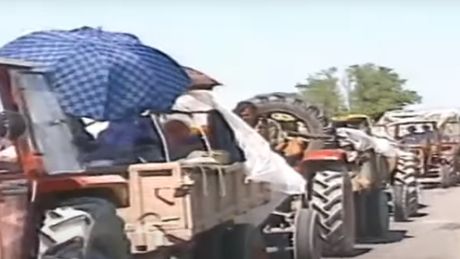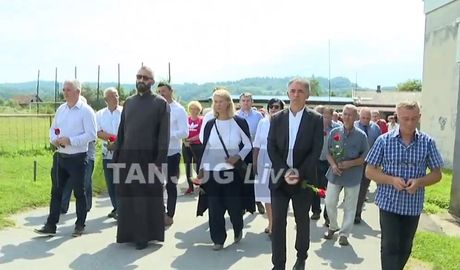Children with special needs were killed in a schoolyard. There were witnesses, but killers are free
Today marks the 25th anniversary of one of the saddest events in modern history, when more than 250,000 ethnic Serbs were expelled from several regions in Croatia, where they had lived for centuries. This happened during Croatia's military operation "Storm." Today, in the Croatian municipality of Dvor na Uni, the anniversary of the persecution and suffering of Serbs was marked.

On this day, people taken out of a psychiatric hospital in Petrinja and a nursing home were killed in Dvor na Uni. They were killed in a schoolyard.
"Children with special needs were killed in front of the primary school in Dvor, next to them were UNPROFOR (UN) staff, next to the, people who lived in nearby houses were also killed. It has been 25 years and there is no answer as to who did it, who killed disabled people and those who were in their homes," said Nikola Arbutina, the mayor of Dvor.
This crime is partly described in the movie "15 Minutes - the Dvor Massacre." This is a documentary film, which showed testimonies of Danish soldiers, who witnessed massacre. They said the killers wore unmarked uniforms.
Arbutina: Good relations between the two countries necessary for survival of Serbs in Croatia
The president of the municipality of Dvor, Nikola Arbutina, said that the survival of Serbs in that municipality and in Croatia in general, requires Croatia to work on good relations with Serbs in that country and with Serbia.
Arbutina recalled that 1,551 people lived in the territory of the municipality of Dvor according to the 1991 census, of which, according to the UNHCR, only 420 did not leave their homes.
"That clearly shows what the 1991-1995 war meant," Arbutina told Tanjug.

According to him, the largest scale return of Serb refugees after the war took place between 1998 and 2001, but they faced existential problems.
He says that they had difficulty managing, so some returned to Serbia or went to third countries, while those who stayed turned to agriculture as their main occupation.
Namely, after Operation Storm there were no companies left in Dvor, where 1,700 people used to work in manufacturing and services.
Asked what the municipality of Dvor needs for Serbs to stay and live there, he said that the Croatian government should help this poor municipality.
He recalled that the municipality has one natural resource, and that is forestry.
Today's commemoration for 64 patients of the psychiatric hospital in Petrinja, who were killed in Dvor during Operation Storm, was also attended by the president of SDSS party, Milorad Pupovac.
Five years ago, a celebration of the 20th anniversary of the end of Operation Storm was held in Dvor, under the high patronage of then President of Croatia Kolinda Grabar Kitarovic, "in remembrance of the long-awaited liberation" - as Croatia's authorities phrased it.
Croats celebrate expulsion of another people as victory day. And no one, except Serbs, criticizes them
In Croatia, the military-police Operation Storm, during which at least 1,800 Serbs were killed, is celebrated as victory day.
A few days ago, the president of the SDSS, Milorad Pupovac, said that Minister of Defense Toma Medved and President of Croatia Zoran Milanovic confirmed to him they would participate in marking the suffering of Serb civilians in Grubori during Operation Storm.
"I spoke with Zoran Milanovic, I saw Medved the day before and they both confirmed that they would come to Grubori," Pupovac told Nova TV's Dnevnik a few days ago, ahead of the celebration of Operation Storm in Knin, after which a commemoration for Serb civilians will take place during August in Grubori.
Regarding the presence of representatives of the Serb national minority to Knin on the anniversary of Operation Storm, Pupovac said that "this burden was taken over by Boris Miilosevic as a member of the government" while he will go to Dvor na Uni on Monday to commemorate the Operation Storm murder of 64 patients of the psychiatric hospital in Petrinja.

Operation Storm was a military action of the Republic of Croatia carried out in August 1995. The goal of this crime was to occupy most of the territory of the Republic of Serb Krajina, an unrecognized state formed in the territory of the newly independent Croatia, which was active during the war, pursuing a policy based on the aspiration of Serbs in Croatia to stay in Yugoslavia.
The operation officially lasted four days, and ended with the fall of the Republic of Serb Krajina and establishment of Croatia's control over that territory.
In February 2015, the International Court of Justice rejected mutual genocide lawsuits filed by Croatia and Serbia, ruling that crimes that occurred during and after Operation Storm could have had elements of genocide, but that no specific genocidal intent had been proven.
August 4 is celebrated in Croatia as "Victory and Homeland Thanksgiving Day" while in Serbia and in the Serb Republic, August 4 is a day of mourning.
(Telegraf.rs)
Video: Festival "Beogradsko proleće" u mts Dvorani
Telegraf.rs zadržava sva prava nad sadržajem. Za preuzimanje sadržaja pogledajte uputstva na stranici Uslovi korišćenja.

